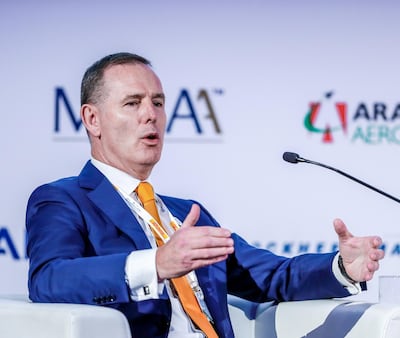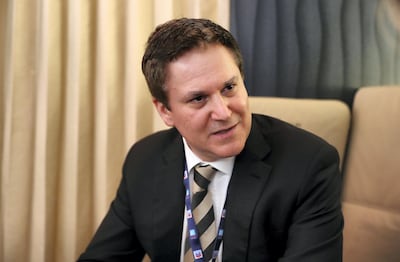Etihad Aviation Group, the owner of Abu Dhabi's state carrier Etihad Airways, unveiled a new corporate structure on Tuesday, including a revised operating model and several senior management appointments, as part of a strategic review to position the company for future growth.
Under the plans, Tony Douglas, group chief executive of Etihad Aviation Group, takes over responsibility for Etihad Airways from chief executive Peter Baumgartner, who was moved to a new role as senior strategic adviser to Mr Douglas.
“We are now well equipped to deliver our plans as a reinvigorated brand, with an optimised and profitable network, technologically advanced fleet, and a strengthened position as the global airline of choice, run by a seasoned team of talented professionals,” Mr Douglas said.
“We are already seeing positive results even during this early phase of our transformation. The eventual aim of this process is for Etihad to be in the best shape to ensure its long-term sustainability, enabling it to meet the challenges of an aviation industry in constant flux.”
Etihad has sought to overhaul its business to recover from reported losses of almost $2 billion (Dh7.34) in 2016. As part of its strategic review, it has backed away from a growth policy of buying minority stakes in global airlines – withdrawing from Air Berlin and Alitalia, which both filed for insolvency – scrapped unprofitable routes, slashed operating costs and appointed Mr Douglas to lead the turnaround plan.
In June Etihad reported narrowed annual losses to $1.52bn for 2017 as a result of its restructuring measures.
The group said on Tuesday the programme has “delivered measurable results to date, with the core airline division [Etihad Airways] reporting a 22 per cent improvement in core operating performance for 2017, driven by improved revenues of $6.1bn and a 7.3 per cent reduction in unit costs.”
Under the new structure, Etihad Aviation Group will be reorganised into seven business divisions – operations, commercial, maintenance, repair and overhaul (MRO), human resources, finance, support services and transformation, led by a new executive leadership team reporting to Mr Douglas.
_______________
Read more:
Etihad Airways narrows annual loss to $1.52 billion amid strategic review
Etihad Airways looks to sustainability regarding future growth
Etihad, Egypt Air expand codeshare pact covering Australia to Africa
_______________
Mohammad Al Bulooki, Etihad Airways' executive vice president, commercial, was promoted to chief operating officer, responsible for core areas including network operations, flight and technical operations, fleet engineering, aviation security and safety, as well the Etihad Airport Services entity, which manages ground and cargo handling and catering. He is also responsible for pilots and cabin crew.
Robin Kamark has been appointed chief commercial officer, overseeing cargo, sales and marketing, revenue management, customer service, network planning, and alliances, as well as the Hala destination marketing arm and airline equity partners.
Ibrahim Nassir was appointed chief human resources and organisational development officer, overseeing organisational development, medical services, talent acquisition, rewards, people services, immigration and Emiratisation.
The new group organisational structure also appointed Abdul Saeed as chief engineering officer MRO, Mark Powers as chief financial officer, Mana Al Mulla as chief support services officer and Akram Alami as chief transformation officer.
Henning Hausen, as general counsel and company secretary; Ahmed Al Qubaisi, senior vice president for government and international affairs; and Amina Taher, vice president of corporate affairs, continue in their respective positions.
“Etihad is now positioned to continue supporting the mandate of our shareholder, and the growth and prominence of Abu Dhabi,” Mr Douglas said.
“The fact that almost half of our leadership team are UAE nationals reflects our strong succession planning efforts and commitment to developing Emirati talent.”



